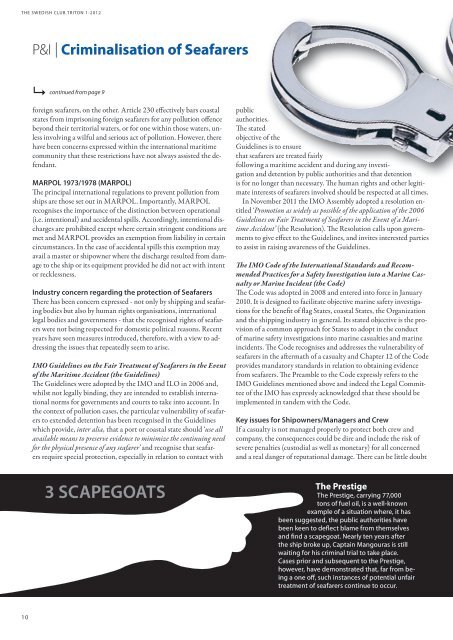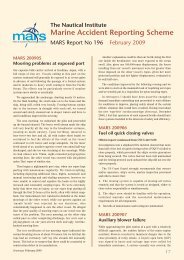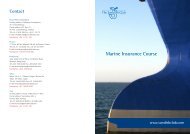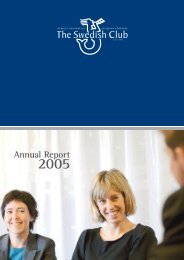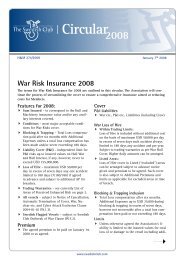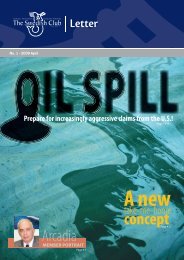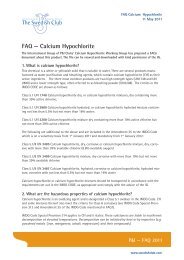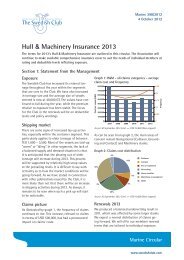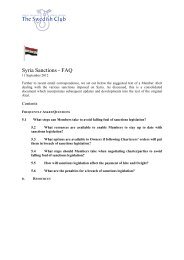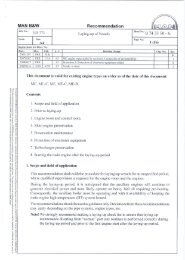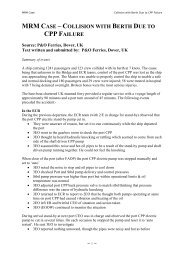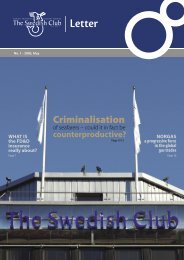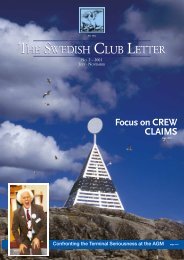TSC Triton no. 1 2012 - The Swedish Club
TSC Triton no. 1 2012 - The Swedish Club
TSC Triton no. 1 2012 - The Swedish Club
- No tags were found...
You also want an ePaper? Increase the reach of your titles
YUMPU automatically turns print PDFs into web optimized ePapers that Google loves.
THE SWEDISH CLUB TRITON 1-<strong>2012</strong>P&I | Criminalisation of Seafarers9continuedfrom page 9foreign seafarers, on the other. Article 230 effectively bars coastalstates from imprisoning foreign seafarers for any pollution offencebeyond their territorial waters, or for one within those waters, unlessinvolving a wilful and serious act of pollution. However, therehave been concerns expressed within the international maritimecommunity that these restrictions have <strong>no</strong>t always assisted the defendant.MARPOL 1973/1978 (MARPOL)<strong>The</strong> principal international regulations to prevent pollution fromships are those set out in MARPOL. Importantly, MARPOLrecognises the importance of the distinction between operational(i.e. intentional) and accidental spills. Accordingly, intentional dischargesare prohibited except where certain stringent conditions aremet and MARPOL provides an exemption from liability in certaincircumstances. In the case of accidental spills this exemption mayavail a master or shipowner where the discharge resulted from damageto the ship or its equipment provided he did <strong>no</strong>t act with intentor recklessness.Industry concern regarding the protection of Seafarers<strong>The</strong>re has been concern expressed - <strong>no</strong>t only by shipping and seafaringbodies but also by human rights organisations, internationallegal bodies and governments - that the recognised rights of seafarerswere <strong>no</strong>t being respected for domestic political reasons. Recentyears have seen measures introduced, therefore, with a view to addressingthe issues that repeatedly seem to arise.IMO Guidelines on the Fair Treatment of Seafarers in the Eventof the Maritime Accident (the Guidelines)<strong>The</strong> Guidelines were adopted by the IMO and ILO in 2006 and,whilst <strong>no</strong>t legally binding, they are intended to establish international<strong>no</strong>rms for governments and courts to take into account. Inthe context of pollution cases, the particular vulnerability of seafarersto extended detention has been recognised in the Guidelineswhich provide, inter alia, that a port or coastal state should ‘use allavailable means to preserve evidence to minimize the continuing needfor the physical presence of any seafarer’ and recognise that seafarersrequire special protection, especially in relation to contact withpublicauthorities.<strong>The</strong> statedobjective of theGuidelines is to ensurethat seafarers are treated fairlyfollowing a maritime accident and during any investigationand detention by public authorities and that detentionis for <strong>no</strong> longer than necessary. <strong>The</strong> human rights and other legitimateinterests of seafarers involved should be respected at all times.In November 2011 the IMO Assembly adopted a resolution entitled‘Promotion as widely as possible of the application of the 2006Guidelines on Fair Treatment of Seafarers in the Event of a MaritimeAccident’ (the Resolution). <strong>The</strong> Resolution calls upon governmentsto give effect to the Guidelines, and invites interested partiesto assist in raising awareness of the Guidelines.<strong>The</strong> IMO Code of the International Standards and RecommendedPractices for a Safety Investigation into a Marine Casualtyor Marine Incident (the Code)<strong>The</strong> Code was adopted in 2008 and entered into force in January2010. It is designed to facilitate objective marine safety investigationsfor the benefit of flag States, coastal States, the Organizationand the shipping industry in general. Its stated objective is the provisio<strong>no</strong>f a common approach for States to adopt in the conductof marine safety investigations into marine casualties and marineincidents. <strong>The</strong> Code recognises and addresses the vulnerability ofseafarers in the aftermath of a casualty and Chapter 12 of the Codeprovides mandatory standards in relation to obtaining evidencefrom seafarers. <strong>The</strong> Preamble to the Code expressly refers to theIMO Guidelines mentioned above and indeed the Legal Committeeof the IMO has expressly ack<strong>no</strong>wledged that these should beimplemented in tandem with the Code.Key issues for Shipowners/Managers and CrewIf a casualty is <strong>no</strong>t managed properly to protect both crew andcompany, the consequences could be dire and include the risk ofsevere penalties (custodial as well as monetary) for all concernedand a real danger of reputational damage. <strong>The</strong>re can be little doubt3 Scapegoats<strong>The</strong> Prestige<strong>The</strong> Prestige, carrying 77,000tons of fuel oil, is a well-k<strong>no</strong>wnexample of a situation where, it hasbeen suggested, the public authorities havebeen keen to deflect blame from themselvesand find a scapegoat. Nearly ten years afterthe ship broke up, Captain Mangouras is stillwaiting for his criminal trial to take place.Cases prior and subsequent to the Prestige,however, have demonstrated that, far from beinga one off, such instances of potential unfairtreatment of seafarers continue to occur.10


